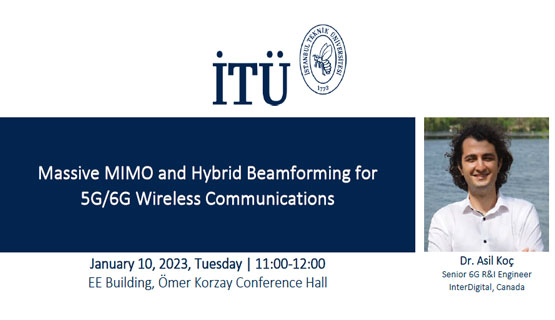Subject: Massive MIMO and Hybrid Beamforming for 5G/6G Wireless Communications
Date: 10 January 2023, Tuesday, Saat:1100-1200
Place: Ömer Korzay Konferans Merkezi - Elektrik-Elektronik Fakültesi, Ayazağa Maslak
Speaker: Dr. Asil Koç

Abstract: Massive MIMO (mMIMO) has been considered as one of the key unlocking technologies in 5G/6G wireless communications. By means of large antenna arrays, high beamforming gain, improved spectral efficiency, and extended coverage, mMIMO technology provides major advantages to support various emerging applications in the next-generation communications systems. Single-stage digital beamforming (DBF) architecture is commonly used in conventional MIMO systems with a limited number of antennas. However, DBF architecture requires a single power-hungry radio frequency (RF) chain for each antenna. Thus, DBF architecture is no longer feasible/practical for the mMIMO systems with large antenna arrays due to the significantly increased hardware cost/complexity and power consumption. Two-stage hybrid beamforming (HBF) has been proposed as a promising architecture for reduced hardware cost/complexity in mMIMO systems. The HBF architecture uses a low number of RF chains to interconnect the analog beamformer and digital precoder/combiner.
This study proposes novel and practical HBF techniques for half-duplex (HD) and full-duplex (FD) mMIMO systems. We aim to address a set of versatile objectives, such as sum-rate maximization, beamforming optimization, interference mitigation, energy efficiency, and self-interference cancellation (SIC).
Bio: ASIL KOC received the B.Sc. degree (Hons.) in electronics and communication engineering and the M.Sc. degree (Hons.) in telecommunication engineering from Istanbul Technical University, Istanbul, Turkey, in 2015 and 2017, respectively. He received the Ph.D. degree in electrical engineering from McGill University, Montreal, QC, Canada in 2022. From 2015 to 2017, he was a Research and Teaching Assistant with the Electronics and Communication Engineering Department, Istanbul Technical University. From 2017 to 2022, he was a Teaching Assistant at McGill University. From 2021 to 2022, he was a Lecturer at McGill University. In 2022, he was a Researcher at Huawei Canada. Since 2023, he has been a Senior 6G R&I Engineer at InterDigital Canada.
His research interests include AI/ML-based wireless communications, massive MIMO, full-duplex, millimeter-wave/terahertz, beamforming, and index modulation. He was a recipient of the Erasmus Scholarship by European Union, the McGill Engineering Doctoral Award, the IEEE ComSoc Student Travel Grant, the Graduate Research Enhancement and Travel Award by McGill University, and the STARaCom Collaborative Grant by the FRQNT.
Seminer-Asil-Koc-EN-2023